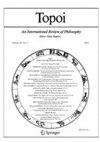Having a Cake and Eating It Too? Direct Realism and Objective Identity in Descartes
IF 1.3
2区 哲学
0 PHILOSOPHY
引用次数: 0
Abstract
Abstract Descartes holds that ideas have or contain objective reality of their objects, so that the idea of the sun is the sun itself existing in the intellect. In this paper, I examine this obscure thesis which grounds the disagreement about Descartes’ commitment to direct or indirect realism. I suggest that, importantly, both readings are correct to a certain extent. I argue that the view of objective reality Descartes develops bears the earmarks of both direct and indirect realist views but must be classified as a third alternative combining some central features of both. I elaborate first on the direct realist interpretations of Descartes’ objective reality and explain their most significant shortcomings. My interpretation of objective identity comes in the form of attributing to Descartes a view about identity and persistence of objects known as sortalism . I argue that Descartes’ objective identity turns out to be much like the Aristotelian view of formal identity , yet without the forms. By way of discussing the case of Theseus’ ship, I point out how Cartesian sortalism, contrary to other versions of sortalism, allows us to analyze the puzzle as a tension between two distinct yet independently legitimate criteria of identity. It is this sortalist insight that helps to render Descartes’ account of objective identity consistent. This point also grounds my argument that we need not consider direct and indirect realism as logical complements, contrary to the received wisdom.有蛋糕也要吃?笛卡尔的直接实在论与客观同一性
笛卡尔认为,观念具有或包含其对象的客观实在性,所以太阳的观念就是存在于理智中的太阳本身。在本文中,我研究了这个模糊的论点,它是关于笛卡尔对直接或间接现实主义的承诺的分歧的基础。我认为,重要的是,两种解读在一定程度上都是正确的。我认为,笛卡尔发展的客观实在观兼具直接现实主义和间接现实主义观点的特点,但必须被归类为结合了两者的一些核心特征的第三种选择。我首先阐述了对笛卡尔客观实在的直接现实主义解释,并解释了它们最显著的缺点。我对客观同一性的解释,是将笛卡尔关于物体的同一性和持久性的观点,也就是sortalism,归功于他。我认为笛卡尔的客观同一性很像亚里士多德的形式同一性,只是没有形式。通过讨论忒修斯的船,我指出笛卡尔的sortsorism,与其他版本的sortsorism相反,如何让我们分析这个谜题,作为两种截然不同但独立合法的身份标准之间的紧张关系。正是这种sortalist式的洞见,使笛卡儿对客观同一性的描述保持一致。这一点也为我的论点奠定了基础,即我们不需要将直接现实主义和间接现实主义视为逻辑上的互补,这与公认的智慧相反。
本文章由计算机程序翻译,如有差异,请以英文原文为准。
求助全文
约1分钟内获得全文
求助全文
来源期刊

TOPOI-AN INTERNATIONAL REVIEW OF PHILOSOPHY
PHILOSOPHY-
CiteScore
3.10
自引率
7.10%
发文量
47
期刊介绍:
Topoi''s main assumption is that philosophy is a lively, provocative, delightful activity, which constantly challenges our received views, relentlessly questions our inherited habits, painstakingly elaborates on how things could be different, in other stories, in counterfactual situations, in alternative possible worlds. Whatever its ideology, whether with the intent of uncovering a truer structure of reality or of soothing our anxiety, of exposing myths or of following them through, the outcome of philosophical activity is always the destabilizing, unsettling generation of doubts, of objections, of criticisms. It follows that this activity is intrinsically a ''dialogue'', that philosophy is first and foremost philosophical discussion, that it requires bringing out conflicting points of view, paying careful, sympathetic attention to their structure, and using this dialectic to articulate one''s approach, to make it richer, more thoughtful, more open to variation and play. And it follows that the spirit which one brings to this activity must be one of tolerance, of always suspecting one''s own blindness and consequently looking with unbiased eye in every corner, without fearing to pass a (fallible) judgment on what is there but also without failing to show interest and respect. Topoi''s structure is a direct expression of this view. To maximize discussion, we devote most or all of this issue to a single topic. And, since discussion is only interesting when it is conducted seriously and responsibly, we usually request the collaboration of a guest-editor, an expert who will identify contributors and interact with them in a constructive way. Because we do not feel tied to any definite philosophical theme (or set of them), we choose the topic with absolute freedom, looking for what is blossoming and thriving, occasionally betting on what might - partly through our attention - ''begin'' to blossom and thrive. And because we do not want our structur e to become our own straightjacket, we are open to contributions not fitting the ''topos'', and do not rule out in principle the possibility of topic-less issues.
 求助内容:
求助内容: 应助结果提醒方式:
应助结果提醒方式:


